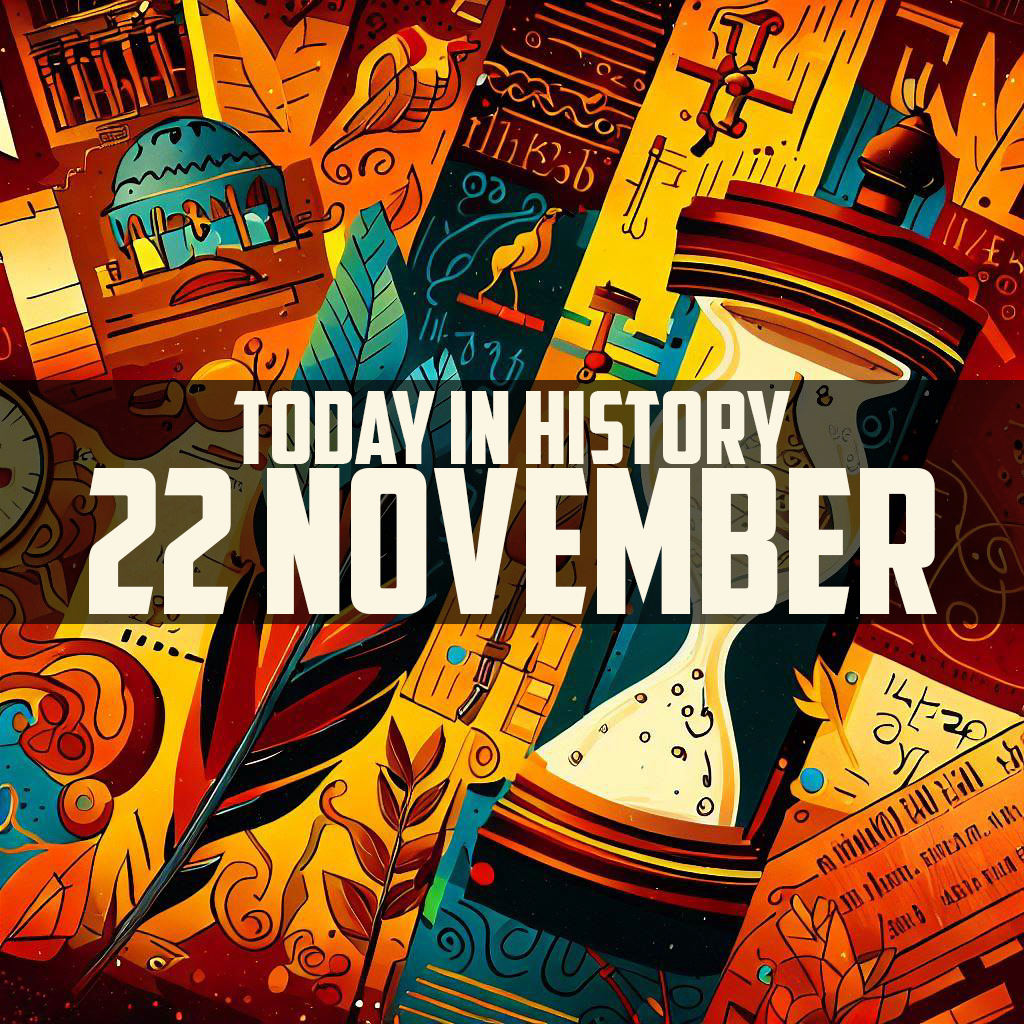The tapestry of human history is adorned with myriad events, both monumental and seemingly mundane. Yet, each thread, each event, contributes to the ever-evolving chronicle of our existence. On the 22nd of November, several significant occurrences have taken place, ranging from political upheavals to scientific discoveries. Let’s explore some of these pivotal moments that have transpired on this day.
Today in History: 22 November

1. 1963: The Assassination of President John F. Kennedy
One of the darkest days in American history, President John F. Kennedy was assassinated in Dallas, Texas. As his motorcade passed through Dealey Plaza, he was struck by two bullets and pronounced dead shortly after. The nation and the world were left in shock. Lee Harvey Oswald was arrested for the crime, but he was killed two days later by Jack Ruby, sparking numerous conspiracy theories about the assassination that persist to this day. Kennedy’s death marked the end of the “Camelot” era, and his legacy remains a subject of debate and admiration.
2. 1928: “Bolero” by Maurice Ravel is Premiered
In Paris, Maurice Ravel’s orchestral work “Bolero” debuted. The composition, recognized for its steady rhythm and orchestration, became Ravel’s most famous piece, even though he once referred to it as “a piece for orchestra without music.” Its repetitive structure and gradual crescendo make it distinct and easily recognizable.
3. 1967: UN Security Council Resolution 242 is Adopted
After the Six-Day War, the United Nations Security Council passed Resolution 242. It emphasized the “inadmissibility of the acquisition of territory by war” and called for the withdrawal of Israeli armed forces from territories occupied in the recent conflict. This resolution remains central to many of the discussions and peace processes concerning the Israeli-Palestinian conflict.
4. 1718: Blackbeard the Pirate Meets His End
Edward Teach, better known as Blackbeard, was one of the most feared pirates of the Caribbean. On this day, he met his demise in a ferocious battle off the coast of North Carolina. Led by Lieutenant Robert Maynard, British sailors confronted and eventually killed the notorious pirate, marking the end of his reign of terror on the high seas.
5. 1935: The First Commercial Flight Across the Pacific
Pan American Airways’ China Clipper took off from Alameda, California, marking the first commercial flight to cross the Pacific. The flying boat, a Martin M-130, reached its destination in Manila, Philippines, after multiple stops. This journey ushered in a new age of commercial aviation and global connectivity.
6. 2005: Angela Merkel Becomes Germany’s First Female Chancellor
A significant political shift occurred in Germany as Angela Merkel was sworn in as the country’s first female chancellor. Merkel’s leadership style, pragmatic and analytical, along with her ability to navigate complex European politics, solidified her status as a leading figure in global politics.
7. 1899: The Birth of Hoagy Carmichael
An influential American composer, pianist, and singer, Hoagy Carmichael was born on this day. He’s best known for classics like “Stardust”, “Georgia on My Mind”, and “Heart and Soul”. His contributions to the Great American Songbook have left an enduring legacy in the world of music.
8. 1963: “Doctor Who” Airs its First Episode
The British science fiction show “Doctor Who” debuted on BBC. Introducing audiences to the enigmatic Time Lord from Gallifrey who travels through time and space in the TARDIS, it went on to become a cultural phenomenon. With its iconic villains like the Daleks and Cybermen, the show has enjoyed decades of popularity and has cemented its place in television history.
9. 1943: RAF Commences Bombing of Berlin
The Royal Air Force began its sustained bombing campaign against Berlin during World War II. These air raids continued for several months, targeting the German capital in an attempt to weaken the Nazi war machine and demoralize its population.
10. 1986: Mike Tyson Becomes Youngest Heavyweight Boxing Champion
At only 20 years of age, Mike Tyson defeated Trevor Berbick, earning the title of the youngest heavyweight boxing champion in history. Tyson’s prowess in the ring, marked by his aggressive style and quick knockouts, made him one of the most recognized and controversial figures in sports.
11. 1975: Juan Carlos I is Proclaimed King of Spain
After the death of General Francisco Franco, Juan Carlos I was officially proclaimed the King of Spain. Juan Carlos played a crucial role in Spain’s transition to democracy and was an instrumental figure in thwarting a military coup in 1981. His reign saw the modernization and European integration of Spain.
12. 1906: The SOS Distress Signal is Adopted Internationally
At the International Radiotelegraphic Convention in Berlin, the SOS distress signal was officially recognized as the standard signal for ships in distress. This easily recognizable signal became instrumental in maritime rescue operations.

Conclusion:
The 22nd of November has been witness to a plethora of events that have shaped the course of human history. From tragic events like the assassination of JFK to cultural milestones like the premiere of “Doctor Who,” this day serves as a poignant reminder of our shared past. It underscores the interconnectedness of events, and how a single day can hold moments of profound sadness, immense joy, and groundbreaking discovery. As we journey through the annals of history, let the events of this day inspire reflection, understanding, and a deeper appreciation of our shared human narrative.
